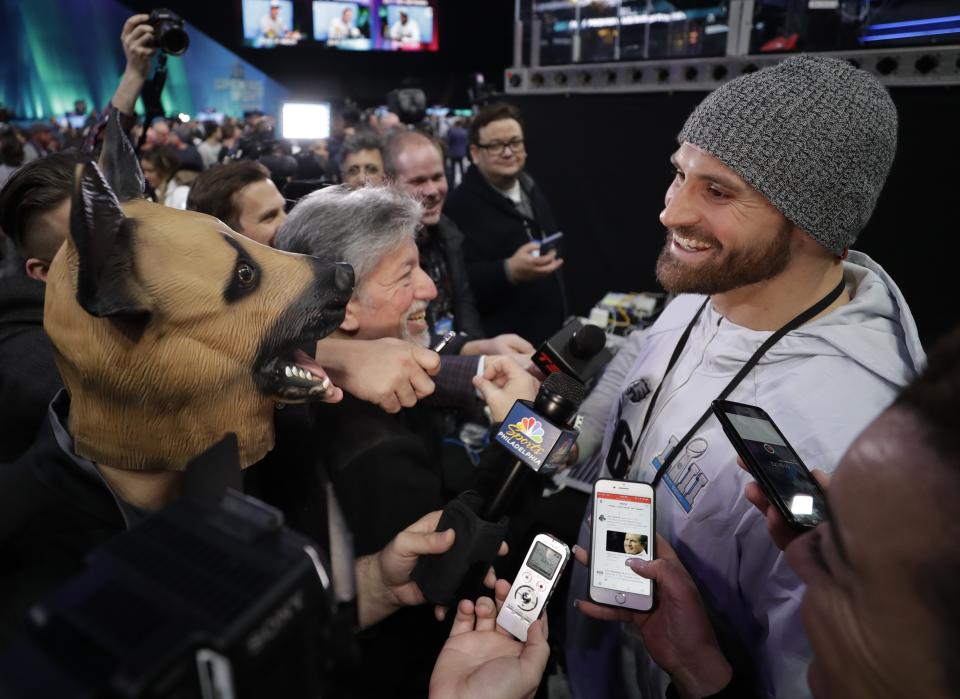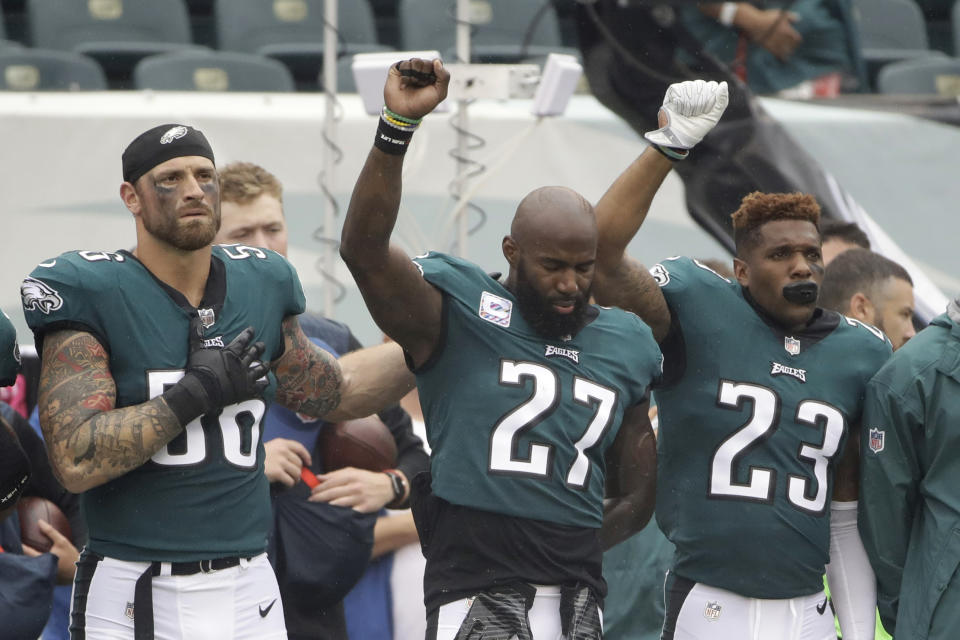Eagles' Chris Long sees wrongs, and wants to help make them right
ST. PAUL, Minn. – Chris Long grew up a child of means.
His father, Howie, is a Hall of Fame defensive lineman and longtime television analyst. NFL players then certainly didn’t make what NFL players do now – Howie made $37,000 as a rookie with the Los Angeles Raiders in 1981, but at in announcing his retirement 13 years later said he’d made more money than he’d ever dreamed – but he made enough to provide a comfortable material life for his family.
Chris is quick to acknowledge that where he grew up, it was a given that every kid in the neighborhood would go to college, and that he took for granted the benefits of going to a private school like St. Anne’s-Belfield in Charlottesville, Virginia.
Long, who is white, has had many privileges afforded to him, both tangible and intangible.
As his fellow NFL players, the ones that don’t look like him and don’t have many of those privileges became more outspoken about the injustices and inequities plaguing many of our systems and communities, Long heard them.
And, more important, he joined them.

Initially, that meant Long laying a supportive hand on the shoulder of his Philadelphia Eagles teammate Malcolm Jenkins when he raised a fist during the national anthem.
“The conversation about race in America, it’s tough for people to get involved in,” Jenkins said on Monday at Super Bowl Opening Night. “I think a lot of people were struggling with how to support and how to do it in a way that was genuine to them. And Chris wasn’t passionate enough to feel like he needed to take a knee or raise a fist, but he wanted to support in a way that was natural to him, and all it took was for him to put his arm around us, and that message was huge to a lot of people who were watching [who saw], ‘OK, I can support you in a way that I believe in. We don’t have to agree on everything, but we can work together.’”
And then Long became an involved part of the Players’ Coalition, the group of current and former NFL players formed in recent months to advance the conversation started by Colin Kaepernick and which has been successful in getting even team owners to listen to their concerns. The coalition counts among its members just two white men: Long and quarterback Josh McCown.
When it’s noted that Long is, well, in the minority in the group, he says he believes that other white players do care, but they might be unsure how to get into the conversation, or maybe something like their contract or status is holding them back. Long has been in the NFL for a decade, and accomplished a lot; he can take the risk on his advocacy possibly affecting his future NFL employment.
But he firmly rejects the notion, set forth by some on social media, that it’s not his fight.
“That’s the point: I had every opportunity, why wouldn’t I want other people to have that opportunity? Especially when I didn’t fully appreciate it,” Long said. “These guys are my best friends, guys that I’ve played with for 10 years in the league, they’re like family to me and we didn’t all come from the same neighborhood. And I can perfectly accept that I might love America but certain teammates might have looked at America through a different lens for most of their life so why is that so hard to just, let’s figure it out a little bit.”

Like many, Long loves the country where he was born, but knows that doesn’t mean it can’t be better.
“I really do believe we live in the best country in the world, and I hate to use this cliché/metaphor, but if you’re on the best team in the world, you don’t stop practicing,” he said. “We’ve got things we need to improve and guys really care about their communities.
“People always point this out: we’re millionaires, we play a sport for a living, this stuff doesn’t affect us in a lot of ways. Well, one, that’s not true for some of my teammates, and two, wouldn’t you want us to care about people less fortunate and fix things that don’t affect us? That’s what guys are trying to do.”
Though he loves this country, Long said earlier Monday that he would again skip the traditional White House visit if the Eagles win on Sunday and are invited; he did not go last year as a member of the Patriots, saying it was the right thing not to go.
On Monday evening he demurred, saying he didn’t want to get into it, and that he had given an answer to a situation that right now is hypothetical.
“We have a whole week to prepare for the Patriots and hopefully you’ll be asking me this question in a week. We’ll cross that bridge when we come to it,” Long said.
Before this season, his 10th in the NFL and his first with the Eagles, Long was debating whether he wanted to put himself through the rigors of another year. He thought maybe he’d do something to make the season special, came up with the idea of donating much of his salary, but then put the idea to the side.
Until Aug. 11-12, when hate and madness and, unfortunately, death, came to his hometown of Charlottesville in the form of a white nationalism rally and counter-protests.
Seeing his city suffer spurred Long to follow through with his idea, and he ended up donating all of his salary this season to different charities. His final 10 games checks went toward educational equality groups in the three cities where he’s played – St. Louis, Boston and Philadelphia. And once he announced what he was doing, fans joined in, doubling Long’s donation.
After Charlottesville, “I was like, well I have to be the walk the walk guy in my own way.” Long saw the chance to not just donate his money, but perhaps be able to give more with fan involvement, and that’s what happened.
Doing the right thing and trying to help others is never wrong. But coming from a man like Long, who was born into a life and a situation not many do, makes his commitment even more meaningful.
“All of the things that Chris is talking about and fighting for, don’t even affect him, and won’t affect his kids,” Jenkins said. “But he sees it as wrong, and he sees it as affecting people, the community he lives in, the community that supports him, cheers for him, and he wants to be part of the solution for equality’s sake, for justice’s sake, and I think that’s a pure place to come from.”


